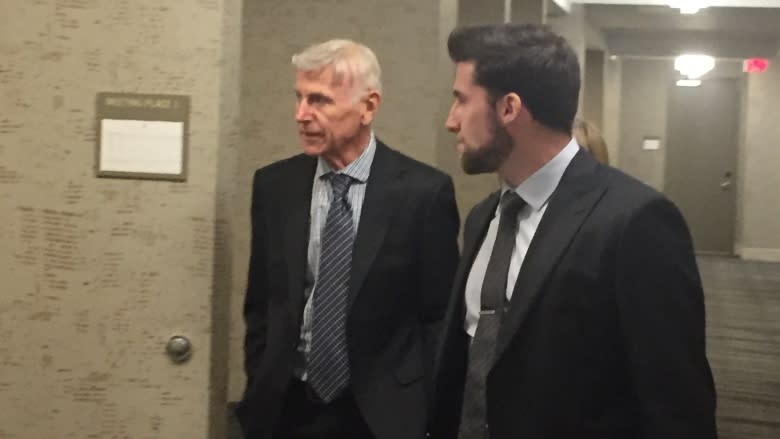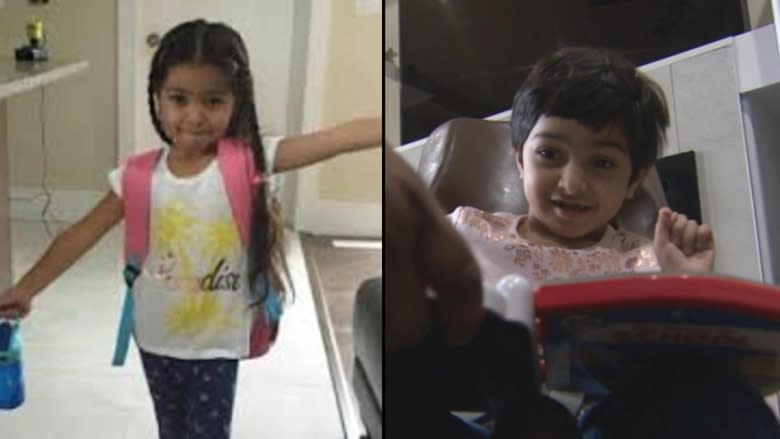Confusion about how Amber Athwal was monitored revealed at unprofessional conduct hearing
Dr. William Mather says he remains haunted by what happened when a four-year-old patient went into medical distress at his downtown dental office more than a year ago.
"It's devastating. You're always thinking about it. It's just a young girl," said Mather, about the incident on Sept. 7, 2016 when Amber Athwal came to his practice for treatment of extensive tooth decay.
The child went into cardiac arrest while recovering from the treatment and the general anesthesia she had been administered. She suffered permanent brain damage because of oxygen deprivation.
Mather, a dentist with more than 40 years' experience, is facing a hearing tribunal by the Alberta Dental Association and College for five counts of unprofessional conduct. He has already pleaded guilty to three charges.
"We tried. We did our very best," Mather said, looking directly at Amber's father, Ramandeep Singh, who sat in the gallery with other family members.
Mather spent several hours testifying on Monday, about everything from the emergency protocols in his office, to the training provided to his staff, to exactly what he saw and did when Amber arrived for a relatively routine dental procedure.
Consultation and treatment
In September 2016, the vast majority of Mather's dental practice was treating patients who required general anesthesia or intravenous sedation.
"I was treating patients that other dentists couldn't or didn't want to," he said.
Children who had either behavioural difficulties or who required extensive dental work were referred to his office for dental work under sedation.
The tribunal heard that Amber and her father arrived around 9:30 a.m., expecting a consultation. Singh has previously testified he told Mather during that consultation that Amber had eaten bread and butter and had milk that morning.
One of Mather's staff has also testified that she heard Singh tell the dentist his daughter had consumed milk that morning.
Anesthesia guidelines state that a person should wait at least six hours after eating before being given a general anesthetic. The risk is that regurgitated food could be aspirated into the lungs.
"At that consultation, somehow I was informed we had an opening later that day ... I knew we had an opening around 11 a.m." Mather said.
"From a convenience factor, Amber was already there ... She had extensive decay ... I suggested to the father we could do Amber's work," Mather said.
"He wasn't sure [if she'd eaten]. He'd have to check with her grandma to see. But it seemed be an OK idea to get the work done because of those reasons. We left it at that."
Mather said he would have asked again before starting the procedure — but there was no written record of that.
He was also asked if he had discussed any serious health risks associated with general anesthesia with Amber's father. Mather said it wasn't his practice to do so.
The procedure and sedation were "uneventful," Mather said. He left the room to attend to another patient and left Amber under the care of nurse Tasneem Ali.
Mather was still with another patient when a staff member told him that Amber was not breathing.
Mather said he rushed into the room and saw Ali doing chest compressions. Mather said he put an oxygen mask on Amber's face and pushed the "flush button" to pump oxygen into her lungs. He said he saw her lungs inflate, and pushed it again.
But Mather said when he lifted Amber's eyelids, he noted her pupils were already dilated — a sign she had been without oxygen for at least four minutes.
An expert witness in the hearing has already testified that Amber's breathing may have been obstructed for as long as seven minutes before going into cardiac arrest.
Mather said Amber had an IV, and that she was hooked up to a machine to monitor her vital signs when he first left her alone with Ali. But it appeared the young girl had neither device attached to her when he came back to the room.
Several witnesses testified the monitor appeared turned off.
Lawyer Julie Gagnon asked Mather why a "strip," which would have recorded Amber's vital signs during the emergency situation, was never printed. "I suggest to you that a strip couldn't be printed because she wasn't attached to a monitor."
"I don't know," Mather said.
Mather insisted the monitor was on when he left the room.
More patients treated
Later that afternoon, Mather wrote an account of what happened and included that Amber's IV had been removed.
Gagnon asked why he never raised a concern about that with Ali, who was charged with Amber's care. She asked why he allowed Ali to monitor another patient who was given general anesthetic later that afternoon.
She also asked whether Mather had considered shutting down his practice after the severe medical emergency that had unfolded that morning.
Mather said no, he didn't consider closing. He said the patient scheduled for treatment that afternoon was being brought to the office from a nursing home.
"I didn't realize what had just happened, that the the outcome was going to be as severe as it was," he said. "In a state of shock, we just continued on."
No mock drills
The hearing heard several admissions about poor record-keeping in Mather's office, including that Ali did not chart the administration of anesthetic fluids during procedures. After the incident with Amber, she also added information to the anesthetic record.
Mather has already admitted he didn't perform mock drills of emergency situations in his office.
On Monday, he acknowledged that a document sent to the dental association following the incident with Amber falsely gave the impression that mock drills had happened at his dental practice.
When asked why he didn't conduct mock drills, Mather said, "Over a period of time, bad habits crept in."
Closing arguments in the hearing are expected Tuesday.





